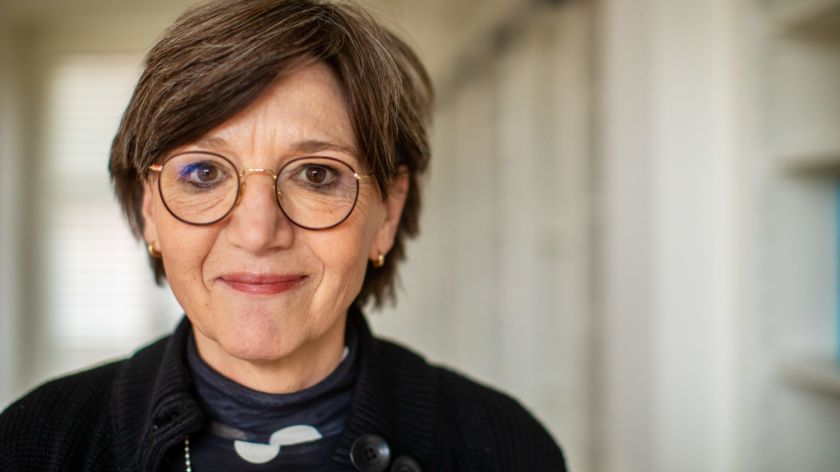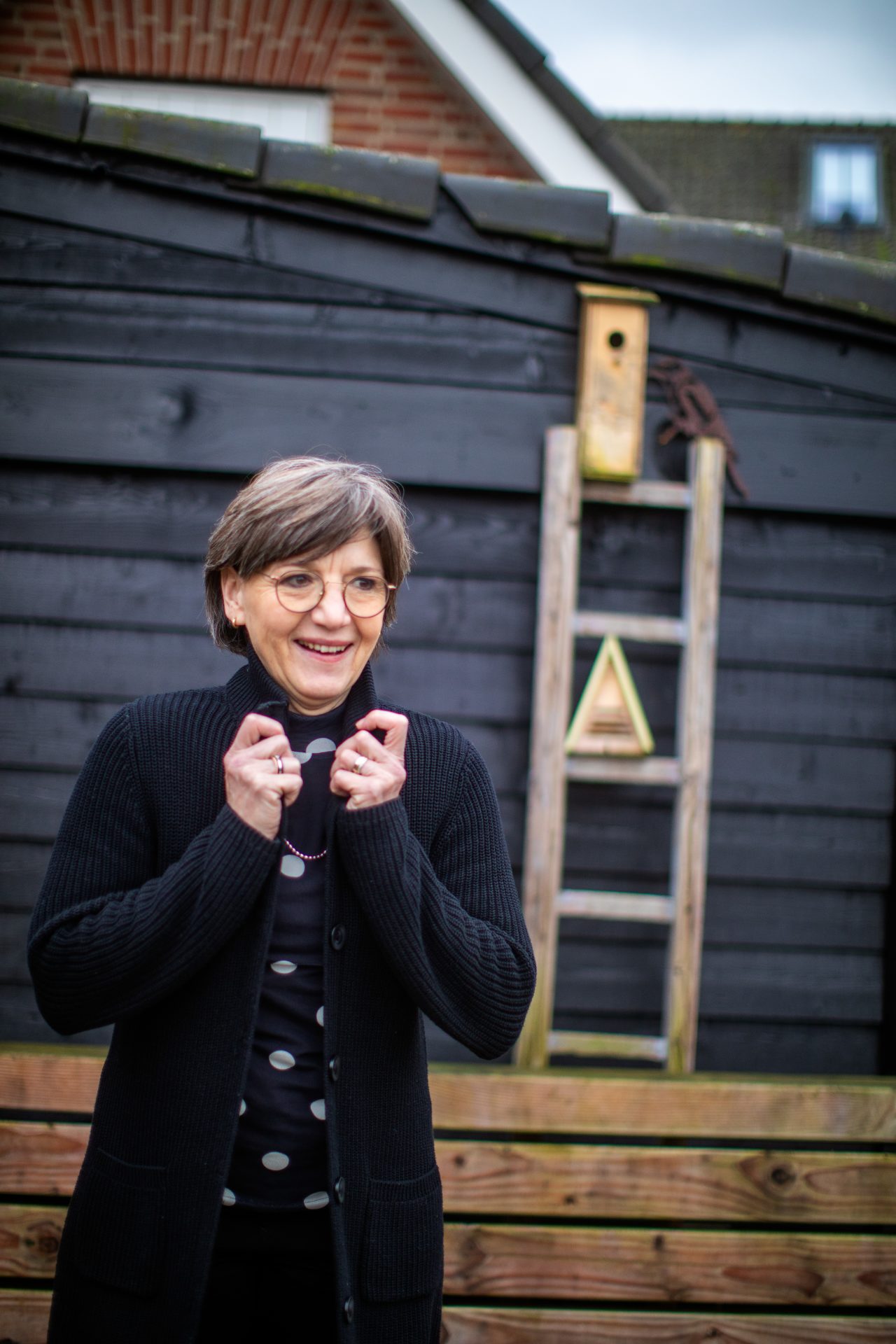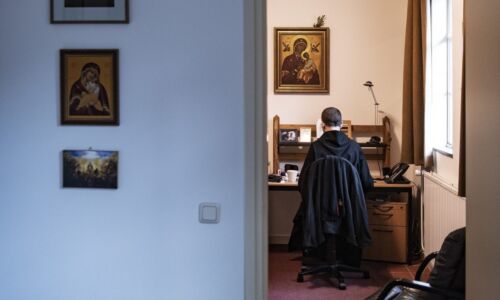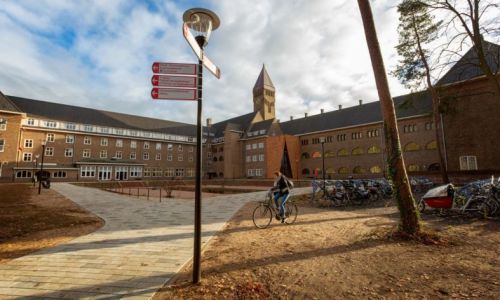Wilma de Koning: ‘We pat ourselves on the back if there’s just one woman on the Board’
-
 Wilma de Koning. Foto: Dick van Aalst
Wilma de Koning. Foto: Dick van Aalst
Wilma de Koning is not an administrator who enjoys being the centre of attention. Not that there was much she could do to escape it these past years. Whether fighting for more women in top positions or addressing the malpractices at the Honours Academy and the Faculty of Philosophy, time and again she was the one held accountable. This week she says goodbye to Radboud University.
It wasn’t something that ever consciously occupied her mind. Yes, Wilma de Koning is a woman, but so what? Until she came to Nijmegen and was introduced as ‘the first woman on the Executive Board.’ That was eight years ago. In an interview with Vox at the time she said she hoped that she had been hired because of her qualities and not her gender. Nor was she a supporter of a quota for women. She believed that any person (male or female) with the right potential and qualities would automatically end up where they deserved to be.
‘If this university has taught me anything, it is that women don’t automatically reach the top’
Her opinion on this has changed. Unfortunately, she adds. ‘If this university has taught me anything, it is that women don’t automatically reach the top.’ She has witnessed this with her own eyes. If you wait, nothing happens. ‘You have to really use instruments to increase the percentage of women.’ A quota, like the one that was applied for a while at the University of Eindhoven of Technology to help more women into professor positions, has not been introduced in Nijmegen. But De Koning is no longer against it. ‘I was forced to change my position on this.’
The Vice President is sitting in front of the former Berchmanianum cloister – where her office is – on a bench in the sunshine. From time to time she closes her eyes to enjoy the spring sunshine on her face. ‘I should have taken the time to do this more often in the last eight years,’ she sighs. But she was busy, she was always busy.
Director of the Royal Netherlands Academy of Sciences (KNAW)
Wilma de Koning (1962) is leaving Radboud University on 1 May and starts this summer as General Director of the Royal Netherlands Academy of Sciences (KNAW) in Amsterdam. In 2013 she joined the Radboud University Executive Board; in 2014 she was appointed Vice President. Prior to this she was a member of the Executive Board at Fontys University of Applied Sciences.
In Nijmegen, the percentage of women professors has increased to 30%, which puts Radboud University at the forefront in the Netherlands, to Wilma de Koning’s great satisfaction. ‘But it’s still not enough. Our goal is 36% by 2025.’
Holding up a mirror
What was her contribution to the gender issue? Keep naming the problem, she says. Hold up a mirror to her colleagues. Never be satisfied with ‘yes, but we don’t have any suitable female candidates.’ This did not always make her popular, she suspects, but De Koning systematically objected every time a faculty tried to put forward yet another male high-flier. Look further, was her relentless answer. ‘You have to be persistent and consistent.’
She remembers a team away day with the deans, at a time when Gerard Meijer was still President of the Executive Board. The gender issue was on the agenda. ‘We had invited speakers to help launch the dialogue. One of them was a dean from the University of York. He said he wasn’t a fan of gender quotas either, but he had seen that the percentage of women at his own faculty was simply not increasing. So he had asked himself: ‘Am I gender biased too? Am I not one of the people who automatically approve these appointments?’ That day we talked about it for hours, and we were strongly confronted with our own behaviour. That session really opened my eyes.’
Because, says De Koning, she discovered that she was also guilty of gender bias. For example, saying about a female candidate that she ‘still needed to develop a number of skills’, while concluding that a male candidate ‘would quickly grow into the job.’ These prejudices were simply built in, even surfacing when she studied job vacancies for herself. She always first checked the requirements, and if there were any she did not meet, she would usually not apply. Men reason differently: they look at the items on which they score well and take the risk.
‘I recently spoke to a woman who wanted to apply for a job. She was hesitating. The usual story. I said to her: Why don’t we start by looking at the requirements you do meet?’
Before De Koning came to Radboud University, she was a member of the Executive Board at Fontys. Of the three members, two were women. Women made up 50% of the management layer beneath that. She had not realised what a big difference there was in this respect between universities of applied sciences and research universities. Once confronted with this in her daily work, she had no choice but to try and redress the balance. In her own words, at the risk of being tedious.
Young mother
Wilma de Koning studied economy and accountancy at Erasmus University Rotterdam. It was a man’s world. Looking back, she finds it incredible how she walked around as one of a handful of women among so many men, but as a student she was not really aware of it. She confidently passed all her exams. She found it normal to not be invited to join in conversations. Plus: she wasn’t really interested in cars or ‘who would be made partner.’ Nor was she in it to make quick money; De Koning wanted to teach.
In her second doctoral candidate year, aged 22, she gave birth to her oldest daughter. She prepared her thesis defence while pregnant with her third. ‘I remember taking an oral examination in Financial Auditing. The midwife had told me to take it easy, but I wanted to complete this final exam. My father was incredibly impressed with everything I was doing, but also a little worried. He drove me to the university and waited for me in the hallway. After I passed the exam, the professor asked me: ‘What do you plan to do, with three young children and a degree in accountancy?’ I looked at him, and said: ‘Work, obviously.’
Which is what she continues to do to this day. As does her husband Rien, who has been her partner since her student days. Looking back, she realises it was all a bit hectic. It is only now that her daughters have children of her own that she is starting to see what a juggling act it was. De Koning, who occasionally babysits her grand-children, is now 58 years old, and she finds herself increasingly longing for a more structured life.

During her two terms as Vice President of the Executive Board, she never had a minute’s peace. De Koning was presented with some heavy dossiers, including malpractices at the Radboud Honours Academy and a culture problem at the Faculty of Philosophy, Theology and Religious Studies (FFTR). To begin with the first crisis: De Koning heard from a whistle-blower that things were getting out of hand at the university’s flagship programme. An investigation led to two men being given other positions within the university and a third one being fired. The latter, Deputy Director, filed a suit against the university.
While the Executive Board had desperately tried to keep all the details out of the media, much of the information was made public anyway via the public trial. The court documents revealed that women had felt threatened, that there had been too much drinking during office hours, and a general lack of steering and control.
De Koning had kept these details to herself because she did not want the victims to be traceable. She kept her word, even when asked by the judge why she had not considered taking Rouwenhorst back. Her answer was that the office staff were simply too afraid of him, something ‘the district judge would understand if he had spoken to these women.’ As a result, the judge missed important evidence and ruled that the university had violated the standards of good employment. The Deputy Director won and was able to leave the university on his own terms, with a large lump sum in his pocket.
Legal reality
It was one of the toughest cases in her career, says De Koning. Although she was forced by the judge to give way, she would not, in retrospect, have done anything differently. ‘We were facing a legal reality that was not ours,’ she says. ‘It was very painful. But we did do the right thing for the staff involved. We had agreed that we would not make public what had been shared with us in confidence. In court, we showed our staff that we were prepared to fight for them, which they saw and appreciated.’
Five years later, word reached her that all was not well at the Faculty of Philosophy. The incoming dean Paul Bakker could suddenly not be made dean anymore because he was the subject of an investigation. The culture on the fifteenth floor of the Erasmus Building was found to be completely unhealthy and interactions between staff members were dubious to say the least. Bakker was accused of ‘inappropriate behaviour’ and is still not allowed to appear on campus. A cultural change process is now being implemented at the Faculty.
‘I would never make information public that might harm the people involved’
Just as with the Honours dossier, contact person De Koning kept her mouth shut when it came to the details of what had happened. Employees and students could ask all they wanted; she did not reveal any details. The Executive Board was accused of ‘censorship’. Wasn’t the academic community entitled to the truth?
‘I understand these questions, I really do. If I had been one of the staff, I would have reasoned in the same way, I think. And the hardest thing is that people would understand our silence better if they knew what had happened. But our job as Executive Board is to protect people. I would never make information public that might harm the people involved. At the same time, we tried to be as transparent as possible about the process.’
Code of conduct
Dossiers like Honours and FFTR did give her sleepless nights, she admits. Because they triggered strong emotions (‘What if it was your own husband or daughter?’), and because they were so complex. How do you deal with the perpetrators and the victims? What do you tell your community? What do you do next? Luckily, the Executive Board consists of three members. ‘When in doubt, we always discussed things with each other. That helped.’ But you can never satisfy everybody.
Will Paul Bakker be coming back to Radboud University? Even now, on the eve of her departure, she refuses to give an answer. What De Koning does know for sure is that social safety is much higher on the university’s agenda than it was eight years ago. ‘That’s not my personal achievement; it’s the spirit of the times. The Me Too movement has made it much easier to talk about it, and more incidents have come to light.’
And yet, every time again, she is shocked by what transpires. Not only in Nijmegen, but also at other universities. Professors intimidating students, women being excluded, violations of basic standards of decency, and abuse of power.
‘We must never reach a point where we accept this kind of behaviour as normal’
‘Personally, I always thought of the university as a place where intelligent people work who know how to behave decently. Clearly, this isn’t always the case. I was really shocked by this discovery. And we must never reach a point where we accept this kind of behaviour as normal. As Executive Board, we have now put in writing everything that is and is not appropriate at a university. We’re drawing up a new code of conduct for staff members. As I say this, I once again realise how idiotic it sounds. Why do we need something like this? But we really do need it. I am sighing deeply as I say this, because it’s such a tragic conclusion.’
With her eyes she follows a dog diving into the pond of the Berchmanianum. She laughs as the owner admonishes his pet. ‘That could have been my dog,’ she says.
In her new job as Director of KNAW, she plans to continue to prioritise social safety in academia. The KNAW has been asked by the Ministry of Education, Culture and Science to write a report on undesirable behaviour in academia, to be completed by late 2021.
Female candidates
What De Koning is really looking forward to is not being so much the centre of attention. She prefers to work in the background. And yes, a slightly less hectic schedule would be nice. She’d like from now on to keep her evenings and weekends free; over the past few years she’s had too little time to devote to her private life. ‘I wonder whether I will succeed.’ A hesitant laugh.
When it comes to work pressure she did not manage to set a good example at the university. Nor did she manage to reduce stress for students and staff, much to her regret. ‘Work pressure is a many-headed monster,’ she sighs. ‘It’s absurd how we pressure and rush each other.’ More money has now been made available and more academic positions have been created, but De Koning will not be around to see the results of these measures.
She tries not to meddle with her successor. Well, actually… she did, at the Board’s request, put some female candidates forward to the Supervisory Board. And should her position not be offered to a woman – which she does not expect to happen – she will certainly speak out.
‘You know,’ says De Koning, ‘maybe we’re too easily satisfied. We pat ourselves on the back if there’s just one woman on the Executive Board. Why not two? Or three? There has never been three at any university. We shouldn’t rest until we reach a real turning point. There’s still a world to gain, also when it comes to diversity in sexual orientation or ethnicity.’
The bells of the Berchmanianum are ringing. Wilma de Koning straightens her back, ready to get up. Over the past COVID-19 year she has hardly spent any time on campus. Now that she’s here, she wants to make full use of the opportunity to get some work done.
De Koning’s portfolio
Wilma de Koning has handled a number of important dossiers. Below is a short selection of her achievements:
She was the driving force behind Radboud Services, a service that integrated the former facilities and support clusters. This megaproject impacted one thousand staff members. She also carried out audits for the support services. De Koning found it strange that only academic departments were reviewed.
She boosted sustainability on campus. The latest strategic plan states that all students must follow at least one course on sustainability as part of their curriculum. ‘That’s something I’m really proud of. But when it came to sustainability, staff members were always impatient. Things never happened fast enough for their liking, even though we made more rapid progress on this than on lots of other dossiers.’
She was involved in the collective labour agreement (CAO) negotiations, and worked hard to guarantee fewer temporary contracts and more permanent positions. She also made sure that PhD students who had accrued delay due to COVID-19 were entitled to a contract extension.
She was involved in the 2016 dissolution of the Institute of Applied Social Sciences (Instituut voor Toegepaste Sociale Wetenschappen, ITS), due to poor financial prospects. To this day, some of the institute’s staff are still on sick leave as a result. ‘I really feel for them. But I can’t go into each individual case. And unfortunately, in my position, it’s impossible to keep 25,000 students and more than 5000 staff members satisfied.’
De Koning tried with all her might to keep the bishops on board. As a Catholic-raised Brabant native, she found it painful to watch the dissolution of the university’s bond with the Catholic Church, culminating last year in Radboud University losing its right to the predicate ‘Catholic’. ‘If it had been up to me, we would have remained Catholic and we would have talked to the bishops about how to shape our Catholic identity in the 21st century.’



